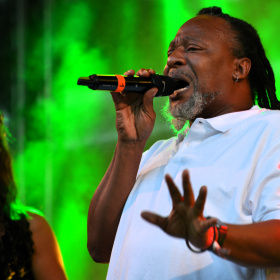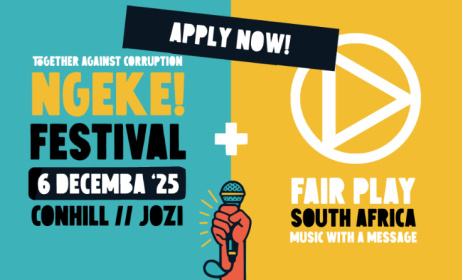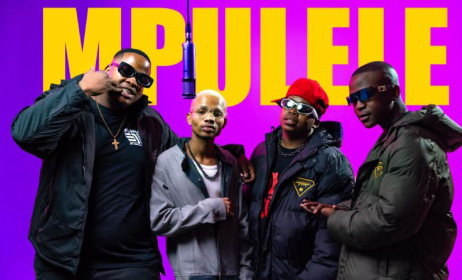Bassline Fest 2019: Maia and the Big Sky to bring Kenyan fusion to Joburg
The role of women in the music industry has become an increasingly frequent topic as women from all walks of life continue to push the envelope in a male-saturated space.
 Maia Von Lekow will be in Johannesburg on 25 May.
Maia Von Lekow will be in Johannesburg on 25 May. Maia & the Big Sky.
Maia & the Big Sky.
But with all the strides made in recent years to include more female professionals in the music scene, the Kenya music industry is still quite patronising to women, particularly with regard to live performances, as Music In Africa found out when we spoke to orutu player Labdi Ommes in April.
In the face of this, singer and guitarist Maia Lekow has built a formidable reputation as a top female composer who embraces deep artistry and pushes the boundaries in Kenya and abroad.
The Maia & The Big Sky frontwoman is today one of the most recognisable voices in Kenya’s live music scene. Since 2010, she has performed at Cool Waters Jazz Festival (Kenya), Blankets & Wine (Kenya), Africa Utopia (UK), the Harare International Festival of the Arts (Zimbabwe), Kigali UP (Rwanda), Sauti za Busara (Zanzibar), Woodford Folk Festival (Australia) and the Perth International Arts Festival (Australia).
On 25 May, Africa Day, Lekow and her band will take to the stage at the incredible Bassline Fest, on Constitution Hill in Johannesburg, South Africa, alongside 12 other African acts including Nigerian headliners Mr Eazi and Asa.
Music In Africa spoke to Lekow ahead of her band's big performance at Bassline Fest.
MUSIC IN AFRICA: What is the first thing that comes to mind when you think about Africa Day.
LEKOW: Bassline Fest comes to my mind because on that day, 25 May, we as musicians who are spread across the continent get to come together on the Bassline Fest stage in cheer and spirit, to share and celebrate what it means to be truly African. It marks the beginning of a quest for the unity of the continent and the political and economic emancipation of its people and cooperation among them. For myself, it's a day where I will get to showcase Kenyan music, culture and diversity.
You performed in South Africa last year. What are you most looking forward to this time around?
The South African audience and energy at Bassline Fest, seeing the different cultures coming together and sharing our music with the continent.
You are the bandleader of the Big Sky. What have the past few years been like for you in keeping the group going?
I am the bandleader, writer and general organiser. I am super lucky with the crew that I play with now. They are my family, they are amazing at what they do and my sound has grown because of their input and individual energies. In the past, though, I have dealt with band members who were excellent at their craft but very unreliable and this is one of the things that plague our industry. I believe in mutual respect. When this is not adhered to, it's crushing. These challenges have only made me stronger.
Why did you opt to fuse traditional and contemporary sounds? Most Kenyan artists don't usually choose to go that route.
My parents loved music. Our house always had jazz, soul and funk records playing in the background, as my father was a well-known singer. I knew from a young age that I was going to make 'my' music. It was not until six years ago that I started consciously researching music from the coast of Kenya, where my family’s roots are. My experience allowed me to be more open-minded to mixing and matching sounds, exploring different rhythms and eventually creating my unique style. For me, this has been a hugely evolutionary step, and the creative possibilities are endless.
What impact has having a sense of identity in your music had on your career?
My music and my identity cannot be separated. It is complex, unique and always changing.
Do you find it discouraging that there aren’t more women in the Kenyan music scene, especially instrumentalist, or do you consider it as a challenge?
Over the past five years, there has been considerable growth of women instrumentalists in Kenya, and this continues to grow. One thing that I tell upcoming female musicians in Kenya is to never rely on someone else. Be the guardian of your own space, sound and creations. I learnt this the hard way, but it made me more determined to learn an instrument, so that no matter what, I could still get on a stage and perform if I had to, and I could compose my music.
It would also be great to see women more represented in the technical services of the music industry. Sound engineers, lighting technicians, festival promoters, managers.
Over the course of your career, what changes have you experienced regarding the role of women in music?
The most significant change in East Africa has been the Internet. It has allowed female musicians to share our music online. It has made learning music more accessible and free, and in doing this, more female musicians are owning their space with confidence and creating excellent quality music. It has also allowed us to bypass certain male-dominated media and music spaces where interactions may have been more challenging for young women in the past.
Why do you think there are only a few spaces for live musicians in Kenya?
DJs are cheaper as compared to live music performers and if the public doesn’t demand it, then venues won't support it.
If there was one thing that you could change about the African music industry now, what would it be?
There should be better opportunities for sharing, cross-pollinating, learning and mentorship across the continent.
In November 2018, you performed at the ACCES music conference in Nairobi, Kenya. How was that experience?
Performing at ACCES last year opened new doors for my music. It was also a great space to network with music industry professionals from across the continent and beyond.
For tickets and more information about Bassline Fest, visit the official website, like the fest on Facebook and follow it on Twitter.
































Comments
Log in or register to post comments